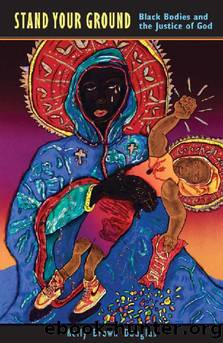Stand Your Ground; Black Bodies and the Justice of God by Kelly Douglas Brown

Author:Kelly Douglas Brown [Brown, Kelly Douglas]
Language: eng
Format: epub
Tags: Theology, Non-fiction, Religion
ISBN: 9781626981096
Amazon: 1626981094
Goodreads: 25315735
Publisher: Orbis Books
Published: 2015-05-04T06:00:00+00:00
Stand-Your-Ground War and the Black Body
â[B]lacks and whites will sooner or later end by entering into conflict.â51 This is the conclusion de Tocqueville reached as he contemplated the significance of slavery in determining the limits of a relationship between white and black people. He says that slavery marked the âNegroâ as inferior and essentially the âpropertyâ of the white man. Using the experience of âfreeâ blacks in the North as an example, he says the âabolition of slavery, therefore does not allow the slave to arrive at freedomâ¦.â52 Even though in this particular comment he was referring to the reality of free Northern blacks ultimately being passed over into the hands of Southern masters, he later broadens its reference. He says, âAs for freed Negroesâ¦they remain half-civilized and deprived of rightsâ¦they come up against the tyranny of laws and the intolerance of mores.â53 To emphasize the dire predicament of âfreed Negroes,â he compares their situation to that of Native Americans. He says, âMore unfortunate in a certain respect than the Indians, they have the remembrance of slavery [working] against them, and they cannot claim the possession of a single spot on the soilâ¦they lead a precarious and miserable existence.â54 De Tocqueville goes on to describe the white âfearâ of free blacks. He suggests that the greatest fear is that of sexual âintermingling,â resulting in a mulatto population. He said what a white person fears most is âresembling the Negro, his former slave, and descending below his white neighbor.â55 He says that as the separation between whites and Negroes are lessened legally there is a sense of âdangerâ that overcomes whites in both the South and the North. The fear is so great, he suggests that âthe abolition of slaveryâ¦will increase the repugnance for blacks felt by the white population.â56 It is because of this understanding that de Tocqueville concludes conflict is inevitable.
De Tocqueville's observations are incredibly prescient. He accurately described the reality of a free black body. The moment the black body steps out of its chattel space, it is an imminent threat to cherished white property. While de Tocqueville described the fear of âinterminglingâ in terms of sexual interaction (and as we noted in Chapter 2 this was an expressed fear, even if imaginary), he could have just as well been describing the fear of blacks âinterminglingâ into the free space of white people. To do such a thing suggested an equality that was intolerable. Indeed, as we have argued, it is a threat to Anglo-Saxon exceptionalism. De Tocqueville essentially describes an inveterate fear of free black bodies that consumes the âwhite population.â The âtyranny of lawsâ and eventual âconflictâ that de Tocqueville describes is nothing less than the enactment of stand-your-ground culture. In essence, de Tocqueville describes the war that is declared on the black body the moment it experiences any form of social-political freedom.
It is no accident that stand-your-ground culture has been most aggressively if not fatally executed after every period in which certain ârightsâ are extended
Download
This site does not store any files on its server. We only index and link to content provided by other sites. Please contact the content providers to delete copyright contents if any and email us, we'll remove relevant links or contents immediately.
Resisting Happiness by Matthew Kelly(2913)
The Social Psychology of Inequality by Unknown(2348)
Designing Your Life by Bill Burnett(2309)
Day by Elie Wiesel(2268)
The Giving Tree by Shel Silverstein(1868)
Angels of God: The Bible, the Church and the Heavenly Hosts by Mike Aquilina(1648)
Human Design by Chetan Parkyn(1598)
Augustine: Conversions to Confessions by Robin Lane Fox(1486)
The Supreme Gift by Paulo Coelho(1469)
Hostage to the Devil by Malachi Martin(1416)
Jesus of Nazareth by Joseph Ratzinger(1410)
7 Secrets of Divine Mercy by Vinny Flynn(1408)
Dark Mysteries of the Vatican by H. Paul Jeffers(1367)
The Vatican Pimpernel by Brian Fleming(1359)
St. Thomas Aquinas by G. K. Chesterton(1333)
Saints & Angels by Doreen Virtue(1324)
My Daily Catholic Bible, NABRE by Thigpen Edited by Dr. Paul(1223)
Called to Life by Jacques Philippe(1216)
The Ratline by Philippe Sands(1186)
